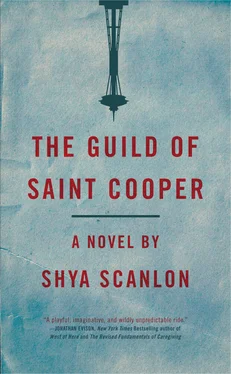We took a right on Spring and schlepped west up the slope. It was a weekday, and everywhere men and women bustled about in business casual. Blake’s simple white summer dress bore elaborate white stitching, so that its shiny thread shone here and there in patterns as she walked and she looked not just out of place but ghostly, a specter haunting the mirror world around us.
On 5th we crossed toward a construction zone. High walls of blue particleboard surrounded the block-sized property, and although nothing could be seen above them, head-level diamond holes had been cut every ten feet. We stood at different diamonds and looked down into the open pit. They were still working on the foundation, and out of the earth surfaced significant concrete squares, home to rebar rods jutting up like fountains of water alchemically transformed mid-spray. Men in hard hats and orange vests swarmed around large yellow earthmovers and called across the lot, waving their arms, or else stood, shovels in the ground, and smoked.
“I don’t remember what was here,” I lied.
“Not surprising. You probably went there a grand total of never.”
“A store for funny hats?”
“That’s not even clever.”
“A gay bathhouse?”
“Close.”
“I give up.”
“It was the library.”
“You’re kidding me,” I said. “They’re getting rid of the library? I thought we were all at least going to pretend that books still mattered.”
“Oh, we’re still pretending, all right. They’re building a new one in its place. Some fancy thing. The architect is someone.”
Near the port-a-potties in the northeast corner of the lot, on the roof of what could only be described as a shack, stood a small sapling with large, wet-looking leaves. It was in a pot.
Blake stood on tiptoe, her hands brought up beneath her chin, her head tipped back. Something about this image reminded me that it was Blake who first convinced me to believe in something. Or rather, to question the irony and chronic sarcasm that had once characterized my every waking minute. It wasn’t that she’d been dull or in any way unable to partake in the serial one-upmanship that throughout high school had become the default mode of interaction between me and most of our friends. If anything, she’d been dangerously spot-on in sussing out someone’s emotional soft spots and directing pithy, squirm-inducing barbs their way. No one would have called her anything but quick-witted. And perhaps that explained it. Perhaps irony had come too easily for her, and thus sincerity had been the greater challenge, one she’d encouraged only sometimes in others but had increasingly demanded of me. She’d once told me that if life were a test, I’d wait until the end and cram.
“I know what else I’d like to cram in the end,” I’d said.
She caught me staring another stare of concern.
“What?” said Blake.
“Nothing.”
“How’s your mom?”
If there was any high left in me, it was now entirely borne away on the wings of serious shit. I wasn’t sure how she’d heard, but I wasn’t surprised she knew. My brother could have told someone, a friend or an old girlfriend — he’d always dated up, age-wise — now close to Blake. Or, for all I knew, Blake was still in touch with my mother, who tended to adopt my exes as though she owed them something. As though in acknowledgment of my unfair treatment.
“The biopsy hasn’t come back yet,” I said.
My mother had discovered a lump.
“But how is she?”
I thought about this. How was my mother? I hadn’t planned on coming home for the summer. I’d planned to spend some time in New York City — somewhere I’d never been — and possibly visit some family in Long Island, relatives on my father’s side I’d only met once at a family reunion when I was twelve. I’d hung around campus for three weeks after finals trying to build up momentum, but my mother had found a lump and I’d come home and now here I was. I’d flown in yesterday and here I was. What was so complicated about that?
“She’s fine,” I said. “You know my mom.”
“I know she’s one of the most generous people I’ve ever met, if that’s what you mean.”
I got the distinct impression that sex was out of the question.
“Do you think,” Blake said, “she would have told you if she didn’t need your help?”
I looked back through the diamond. I didn’t like the tone Blake was taking with me. It was accusatory, but worse, it seemed a little sad. Her fears about me had been confirmed. She was disappointed. Worst of all was the fact that, from the moment I’d heard about the lump, I’d absolutely known it was cancer. It was a feeling I could neither explain nor express — like everyone else, I’d told her, told her to her face, that it was probably just a cyst, that it was probably harmless. But I knew otherwise.
“What do you think that tree is for?” I called through the little window.
I looked for Blake’s nose poking through her diamond, but it didn’t come.
“It’s like a spirit animal,” I said. “Like some kind of ancient druidic defense against bad luck. Wasn’t it the Druids who gave us Christmas trees?”
I was trying to think of a pun involving port-a-potties and the word “protection” when I felt Blake’s hands on my shoulders. I turned around and she was standing behind me, her back to traffic, looking up at me with watering eyes. I had once wanted to write the book of love with this person, and now there seemed to be a library-sized chasm between us. How could I tell her there was no hope? How could I explain that the best thing to do was simply move from one moment to the next, doing as little damage as possible?
Blake put her arms around my waist and leaned in, pulling herself into my body and tucking her head beneath my chin.
“Go be with your mother,” she said. “It’s really nice to see you, and we should hang out again soon, but go be with your mom. Just be with her.”
On the bus home, the woman sitting beside me was reading Bartlett’s Familiar Quotations . She flipped through randomly, then stabbed her finger down onto the paper with a hollow pock. The first was from Elie Wiesel. It said, “I was the accuser, God the accused.” The next one was from Ronald Reagan: “Facts are stupid things.” Another seat opened up and I moved.
Seeing the excavation site had rattled me a little. They’d torn out the city’s heart, and without the blood of books pumping through its veins, it was only a matter of time before we’d shrivel and sink into the Sound. What if, like so many redevelopment projects, it took far longer than expected, or simply stalled in a budgetary limbo? The image of that gruesome hole would stay with me for days.
The bus ran along Lake Union, crossed the canal, and snaked through Fremont, a place once cheekily self-described as “the center of the world” and now coming to resemble it more than the hippies and artists who’d nicknamed it would have liked. Five or six years ago, I’d been walking home along this route from an antiwar rally at Gas Works Park. It had been cold, unusually cold for Seattle, and I’d used my last dollar to buy a large coffee from 7-11. Toward the end of my walk, feeling it was not radiating enough warmth through the paper cup, I’d poured it over my hands. This decision did not, in retrospect, make any sense. Had I actually made it? The thing about knowing my mom’s test would come back positive was not only the knowledge itself, the mystery of its origin and the terrible weight of keeping the secret. It was also that I experienced no associated feeling of loss. I knew this was a product of denial, but that didn’t prevent me from feeling guilty. Or from trying to escape. The fact was, Blake had sent me back to exactly where I didn’t want to be. Of course, facts are stupid things, as I now knew. But still.
Читать дальше












